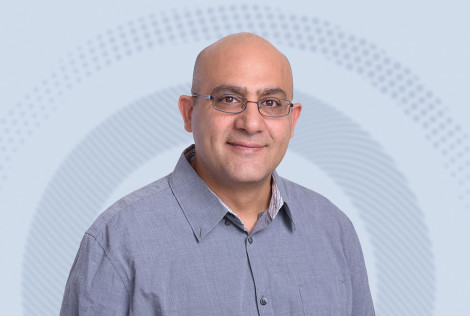Prof. Doron Naveh Wins Rector’s Prize for Scientific Innovation

Professor Naveh spearheaded the development of an innovative on-chip photospectrometer capable of measuring the light spectrum without the need for additional optical components, thanks to a combination of advanced electronic devices based on innovative materials and AI algorithms for data analysis
Prof. Doron Naveh is one of eleven recipients of Bar-Ilan University's 2025 Rector’s Prize for Scientific Innovation. The prize was awarded to Prof. Naveh for his innovative development of an on-chip photospectrometer: a minuscule nano-electronic device capable of measuring the spectrum of light. Until now, such measurements were performed using large and expensive instruments that require frequent calibrations and extensive expertise to operate. “The spectrometer I currently have in my lab is 180 cm long and costs hundreds of thousands of euros,” says Prof. Naveh. “This chip can be installed in a mobile phone, smartwatch, or various computer systems, and used to perform different types of measurements without the need for additional mechanical or optical components.”
Optical spectral measurement can be used to identify materials and mixtures easily and quickly, even when such materials appear as identical to us. “Every material in nature, or a mixture of materials, reflects a different optical spectrum, but the human eye has very low resolution and usually cannot distinguish between such spectral differences," explains Prof. Naveh. “Different metals, aluminum or nickel, for example, appear identical to the human eye–but in fact emit different optical spectra. The same applies to different powders, such as sugar and salt, or solutions, such as sugar water or salt water. Optical spectral measurement can easily determine which material or mixture we are dealing with. Moreover, if we add an additional computational layer and train the algorithm to decode the meaning of the measured spectrum and calibrate the relative quantity of components in a solution, we can not only identify solutions that differ from one another–we can decode the concentration of each component in each solution.”
Prof. Naveh’s creation is a miniature nano-electronic device made from innovative two-dimensional materials, combined with software that uses AI, machine learning, and algorithms to decode the data. “This project was performed by many co-researchers in Israel and around the world, including Prof. Amir Leshem and Dr. Eitan Fetaya from the Faculty of Engineering,” says Prof. Naveh. “This work integrates several fields, and that's where our innovation lies. It’s also very interesting for students, who can engage with interdisciplinary matters and different aspects of a particular problem.”
The implications of this development are far-reaching. “With the right application development, such smart sensors will enable the acquisition of spectra from your smartphone camera at the grocery store, measuring glucose levels in fruit and water concentration, allowing consumers to determine whether the fruit is sweet and ripe,” elaborates Prof. Naveh. “Another possible application is monitoring blood sugar levels. The blood vessels underneath the skin also reflect light, but this reflection varies from person to person according to skin color or fat layer thickness, so each person has their own personal spectra, which also changes throughout the day because blood sugar levels fluctuate, for instance, when we wake up in the morning or after a good meal. But if we develop an application that performs personal calibration for the user, it could measure their blood sugar levels, which would help diabetes patients by offering non-invasive testing. Similarly, the system could work with an application that measures blood alcohol levels.”
In the coming years, Prof. Naveh’s research team will be examining whether such devices can also contribute to environmental protection, detecting gas concentrations in the air and monitoring air pollution or water contamination. In the near future, Prof. Naveh plans to begin exploring the biological applications by identifying and classifying bacterial and fungal deposits.
Alongside Prof. Naveh, ten other Bar-Ilan researchers won the 2025 Rector’s Prize for Scientific Innovation: Prof. Yaron Orenstein from the Faculty of Life Sciences and the Department of Computer Science, Prof. Ilana Blumberg from the Department of English Linguistics and Literature, Prof. Alexander Guterman from the Department of Mathematics, Dr. Uriel Gellman from the Department of Jewish History and Contemporary Jewry, Prof. Yehuda Halper from the Department of Jewish Philosophy, Prof. David Zitoun from the Department of Chemistry, Dr. Eylon Yogev from the Department of Computer Science, Prof. Yair Lorberbaum from the Faculty of Law, Prof. Miri Rosmarin from the Gender Studies Program, and Prof. Orly Shapira-Lishchinsky from the Faculty of Education. You can read about their groundbreaking research here.
Last Updated Date : 04/06/2025



